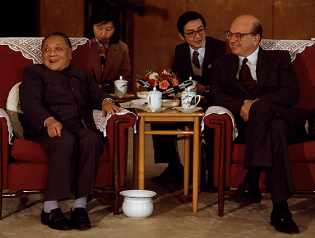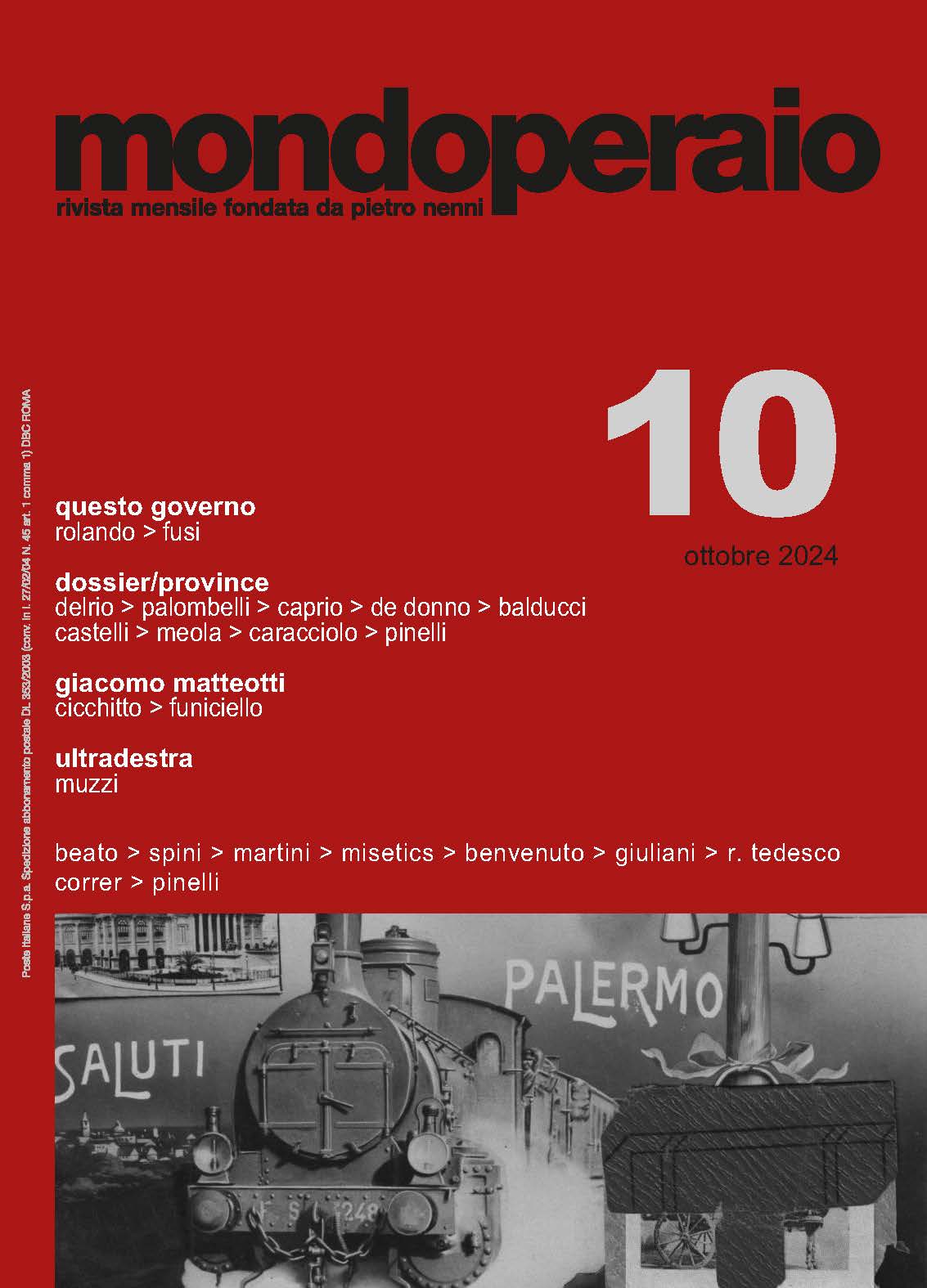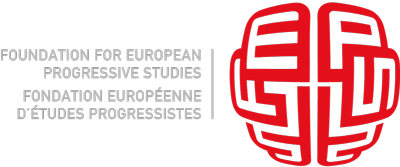
Il blog curato da Sandro Magister (http://magister.blogautore.espresso.repubblica.it) molto influente e consultato dai corrispondenti dei media mondiali presso la Santa Sede ha presentato e diffuso in inglese, spagnolo e francese una gran parte dell’articolo di Gennaro Acquaviva apparso sul numero di febbraio di Mondoperaio con il titolo “La predica e la pratica”.
Riportiamo l’introduzione di Magister e l’estratto nella traduzione inglese.
RIVELAZIONI. I PRIMI CONTATTI TRA VATICANO E PECHINO COMINCIARONO 32 ANNI FA. COSI’
di Sandro Magister
Ora sappiamo. Ad aprire la strada ai contatti tra la Santa Sede e le autorità di Pechino fu, nel lontano 1986, una visita di Stato dell’Italia nella Cina comunista, quando capo del governo a Roma era il socialista Bettino Craxi e ministro degli esteri il democristiano Giulio Andreotti.
È quanto ha rivelato Gennaro Acquaviva, all’epoca capo della segreteria di Craxi e suo primo consigliere per gli affari ecclesiastici, in un articolo sull’ultimo numero della rivista “Mondoperaio”.
Due anni prima, nel 1984, Acquaviva, cattolico, era stato tra i tessitori del nuovo concordato tra la Santa Sede e l’Italia.
Non sorprende, quindi, che dal Vaticano – nella persona dell’allora segretario per i rapporti con gli Stati monsignor Achille Silvestrini, dal 1988 cardinale – chiedessero proprio ad Acquaviva di far sì che Craxi e Andreotti si facessero ambasciatori, a Pechino, della richiesta della Santa Sede di entrare in contatto con le autorità cinesi.
Il tutto doveva avvenire per via riservatissima. E così fu. L’ambasceria andò a buon fine e già “pochi giorni dopo” vi fu il primo incontro segreto tra rappresentanti del Vaticano e della Cina, nella nunziatura della Santa Sede in Italia.
Nella foto sopra, l’incontro ufficiale a Pechino tra il capo del governo italiano Craxi e l’allora “dominus” della Cina postmaoista Deng Xiaoping.
Mentre più sotto è riprodotto nei suoi passaggi salienti il memoriale di Acquaviva pubblicato su “Mondoperaio”. Che è di grande interesse anche per il racconto di una visita sua e di Andreotti, autorizzata e controllatissima, alla cattedrale di Shanghai e al suo vescovo “ufficiale” di nomina governativa, del quale Acquaviva scrive di non aver appuntato il nome, ma che risulta essere il gesuita Aloysius Jin Luxian, riconciliato con Roma nel 2005 e morto nel 2013.
Acquaviva addita in quel vescovo “ufficiale”, eppure anche “romano”, il simbolo dell’accordo che è oggi in corso di stipula tra il Vaticano e Pechino, concernente proprio la nomina dei futuri vescovi cinesi, la cui prima scelta spetterà alle autorità comuniste.
E si può capire questa simpatia di Acquaviva per tale accordo, se appena si tiene conto della sua sperimentata attitudine “concordataria”, come pure del suo fervente apprezzamento della politica vaticana degli anni Sessanta e Settanta nei confronti dei regimi comunisti, sotto l’impulso di Agostino Casaroli.
Nello stesso tempo, però, Acquaviva riconosce che quei contatti tra la Santa Sede e Pechino inaugurati anche grazie a lui nel 1986 non hanno prodotto, per decenni, praticamente nessun risultato, se è vero che solo oggi si comincia a intravedere un primo, minimo tentativo di accordo, oltretutto già ritenuto un “tradimento” da un osservatore e protagonista di rilievo come il cardinale Giuseppe Zen Zekiun, vescovo emerito di Hong Kong.
Un’ultima notazione – prima di lasciare spazio al memoriale – riguarda l’allora ministro degli esteri Andreotti.
Grande conoscitore di cose vaticane, Andreotti è stato anche direttore, dal 1993 al 2012, del mensile cattolico plurilingue “30 Giorni”. Che da sei anni ha cessato le pubblicazioni, ma tra i cui redattori c’erano giornalisti – come Andrea Tornielli, Gianni Valente, Stefania Falasca – amici di Jorge Mario Bergoglio già da prima che fosse eletto papa e oggi accesissimi sostenitori delle sue scelte, compresa la politica di “appeasement” con la Cina.
CRAXI AND ANDREOTTI, AMBASSADORS OF THE VATICAN IN CHINA
by Gennaro Acquaviva
The recent decision of Pope Francis to set up a third section of the secretariat of state dedicated to dealing with the questions that specifically concern the persons who work in the diplomatic service of the Holy See […] has been blown out of proportion, to the point of becoming almost symbolic, by the harsh controversy that emerged publicly following the stance taken by the elderly, and emeritus, cardinal of Hong Kong, Joseph Zen: who has judged the actions taken or announced by the secretariat of state in the appointment of several bishops in communist China as a grave backsliding with respect to “canonical correctness” itself. A public and explicit accusation that was first of all addressed to that subject of the Vatican curia, the secretariat of state itself, which has recently been expanded in its functions and also in its influence by a decision from the pope.
Cardinal Zen spoke with journalists using on the issue a language that was hardly curial, and forcefully denouncing a sort of “betrayal” perpetrated by the officials of the secretariat of state with respect to this, which still remains a sore spot and a decisive one for Vatican policy: that which is connected to the endurance and perpetuation, for decades and even from the beginning of the 1950’s, of an action that saw the opposition between the Vatican and the Chinese government over the freedom to witness for Catholics, as also in the management of the Catholic Church on that continent, after the advent of the communist regime.
As many will recall, this was a matter right from the beginning of a question of the most difficult composition, further complicated by geopolitical division: so much so as to endure today in its critical state, above all in terms of the role and functions of the pope of Rome in the appointment of Chinese bishops, in particular with respect to their apostolic, free, accepted, and “legitimate” testimony in the People’s Republic of China.
It is precisely with regard to this argument, thorny and very difficult to solve, that I permit myself to present a personal memory that goes all the way back to the time of the Craxi government (1983-1987), regarding an action of his that until now has been absolutely unknown and at the time was effected precisely in regard to this topic. […]
*
The event had as its backdrop a state visit – the first in the history of the Italian Republic – of our government to that of China, dominated at the time by Deng Xiaoping, which took place in the final days of October of 1986. […]
In that October of 1986 the Vatican secretariat of state, in the person of then-archbishop Achille Silvestrini, contacted me to ask us to add, albeit confidentially, into the high-level conversations with the Chinese the expression of a strong Italian request that the possibility of an encounter between the Vatican and the government of the Republic of China in reference to the condition of illegality to which Chinese Catholics and their pastors “in communion with the pope” were being subjected could finally be opened and allow the solution of a problem seen as being fairly serious.
Silvestrini emphasized to me the Vatican desire that this should take place rapidly, given the new policy of openness inaugurated by the government of Mao’s successors, by then under the leadership of Deng; and he strongly implored me to act as a go-between with Prime Minister Craxi so that this desire of theirs might be brought, in the forms possible but with great determination, to the attention of the high-level talks in Beijing.
This is what happened, in part due to Craxi’s determined support. And at the end of the official meetings it was communicated to us by the Chinese government (specifying that the response was reserved for the president of the Italian council and not for its foreign minister) that we were authorized to inform the Holy See that the requested bilateral talks would be opened as soon as possible through the diplomatic office of the Chinese republic in Rome: something that in fact happened a few days later, using for the talks the office of the Vatican nunciature to the Italian republic.
I would like to say again that I am presenting the memory of an episode that happened no less than 32 years ago. What has happened over all these years in relations between the two “contenders” is difficult to know and comprehend, even if the decision that Cardinal Zen now attributes to what he himself calls a “betrayal” by the Vatican would seem to indicate that practically nothing new and above all constructive has take place over this long period. […]
*
[But there was] another episode, following that trip to China, that was also helpful in fostering the first talks between the two sides.
Having left Beijing after the official meetings, the Italian delegation made a stop in Shanghai. […] The second of those two days during which we stayed in Shanghai was November 2; the previous evening, before going to sleep, Andreotti while saying goodnight proposed to me that I go with him the next morning, early, to the Mass that would be celebrated at the primatial basilica of the Catholic diocese of Shanghai. And so we went together to participate in the Mass “of the dead,” celebrated inside a grand church that we were told had been built in the 1920’s and had just been reconsecrated and opened for worship.
The thoroughly informed Andreotti, in entering the basilica, whispered to me in his own way: “They have just restored it to function, the basilica, because it had become a tractor factory during the revolution of the Red Guards.” They brought us in through a side entrance and we immediately found ourselves in an immense nave: a place packed with many silent Chinese, poorly dressed in their gray-green uniform, like many we had encountered throughout the whole trip; and most of them were praying on their knees. They led us to a pew in front of the altar and the celebrant immediately entered, accompanied by a group of altar boys. The vestments were all black and at the entrance the whole church intoned, accompanied by an organ, a Gregorian chant that immediately made me feel at home. The Mass was said entirely in Latin, with the whole multitude of the faithful responding and singing in that language which, I thought then, for them must have been a particular part of their identity: the “language of Rome.”
Afterward they took us to the sacristy. We were surrounded by interpreters and escorts: many of them, without a doubt, were “spies.” Andreotti was there, naturally, accompanied by his wife; and the Italian ambassador had also come. We entered into an old-style sacristy, which smelled of fabric but was perfectly clean. Immediately there came forward, and sat down at the head of the table, a Chinese man dressed stylishly in clerical garb and wearing a zucchetto like a bishop’s. He looked Andreotti in the face and enunciated in very clear but halting Italian: “I am Bishop…” and said his name, which unfortunately I did not take down and now do not remember. Then he added, again in Italian: “I am a Jesuit.” He paused for a moment and then went on speaking in Chinese, while the translator repeated his words for us. He told us that he had been ordained as a priest before the end of the war, and that immediately afterward his superiors had sent him to Rome, to attend the Gregorian University, from which he graduated in 1949. He referred to the Roman seminary and began rattling off the names of some of his professors of those bygone days. And it was at that point that Andreotti, who had remained shocked and silent like all of us at hearing the bishop speak in Italian, conversed comfortably with him, bringing back to mind episodes of those old professors whom he too had naturally known back then. They exchanged a few generic remarks on their shared memories, and then the bishop got up, shook our hands, and left as silently as he had come in.
This was the Catholic bishop of Shanghai, who obviously had been automatically excommunicated because he had been selected and appointed by the “patriotic Church” and was therefore not “in communion” with the pope of Rome: but in office as pastor of his flock faithful to Jesus Christ and to his Church, in that long-ago November of 1986. This Jesuit priest, who had studied at the Gregorian and was not ashamed of having been appointed to that role in that he was a member of the Church faithful to communist China, this morning was not afraid of addressing the representatives of a capitalist nation allied with the United States and closely wedded to the Church of Rome, without concealing his fidelity to the Gospel and therefore also to the pope: but also to his people, the Catholic people of his nation, “communist” though it may be. I think that this distant episode could explain fairly well the current decision, missionary and evangelical but also lucidly courageous and universal, of Pope Francis.
(English translation by Matthew Sherry, Ballwin, Missouri, U.S.A.)





Commento ( 1 )
La mafia chiede il pizzo in farmacia says:
28 Ottobre 2023 at 3:02Dio vede e provvede sempre.